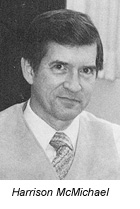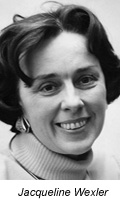Deaths |
|
January 24, 2012,
Volume 58, No. 19
|
Dr. Clark, Neurology
 Dr. Christopher M. Clark, a neurologist and associate professor of neurology in the Perelman School of Medicine, whose research contributed to the clinical and scientific advances that moved Alzheimer’s disease from a poorly understood and rarely diagnosed disease to a widely recognized and common cause of late-life dementia, died of sarcoma on January 12. He was 65 years of age. Dr. Christopher M. Clark, a neurologist and associate professor of neurology in the Perelman School of Medicine, whose research contributed to the clinical and scientific advances that moved Alzheimer’s disease from a poorly understood and rarely diagnosed disease to a widely recognized and common cause of late-life dementia, died of sarcoma on January 12. He was 65 years of age.
Dr. Clark’s career was devoted to establishing the US clinical research and clinical trial network for advancing diagnostics and therapeutics in Alzheimer’s disease. He was director of the Duke University Memory Disorders Clinic, and the clinical director of the University’s Joseph and Kathleen Bryan Alzheimer’s Research Center from 1986-1989.
From 1990 to 2007, he served as the director of the Clinical Core of the National Institute of Aging funded Alzheimer’s Disease Center at the University of Pennsylvania, as well as the associate director of this Center and was among the leaders in establishing the Penn Memory Center, where he served as director.
After retiring from Penn in 2007, Dr. Clark worked as the medical director for AVID Radiopharmaceuticals. He led the investigator team that demonstrated the ability of a brain imaging method (known as an Aβ amyloid PET scan) to detect brain deposits of Aβ amyloid, a type of brain pathology that is widely recognized to be one of the two defining pathologies of Alzheimer’s disease. This research, published in the Journal of the American Medical Association in 2011, is regarded as a landmark study for advancing clinically applicable Alzheimer’s disease diagnostics. The PET scan ligand Dr. Clark evaluated in this study, is currently before the FDA for review and approval.
Dr. Clark was one of the founding participants in the Alzheimer’s Disease Cooperative Study, a National Institute of Aging funded clinical trials network that established a national infrastructure for Alzheimer’s disease clinical trials and conducted the first clinical trials in patients with Alzheimer’s disease.
He had a particular commitment to developing efficient methods for the early and reliable diagnosis of Alzheimer’s disease that could be readily adopted into routine primary care clinical practice, the evaluation of Alzheimer’s disease treatments, and the relationship between Parkinson’s disease and Alzheimer’s disease. He co-developed the Dementia Severity Rating Scale, a self-administered scale that a family member could complete and whose scores assisted in diagnosing dementia and mild cognitive impairment. He was a mentor to many faculty and staff.
Dr. John Trojanowski, director of Penn’s Alzheimers Disease Center and a collaborator with Dr. Clark for nearly 20 years recalls how “Chris was an inspiration to all of us and a beacon of hope to patients with Alzheimer’s and their families. I and my colleagues at Penn, our patients and their families and many in the global Alzheimer community who knew Chris will miss him dearly, but we all are inspired by Chris to continue the effort to create a world without Alzheimer’s disease.”
Born in Norfolk, Virginia, Dr. Clark earned his BS degree from Penn State University in 1967 and his MD from Thomas Jefferson University in 1973. He then trained in neurology at Pennsylvania Hospital and Columbia-Presbyterian Medical Center.
Dr. Clark is survived by his wife, Anne; stepsons, David Emrich and Matthew Emrich; and his siblings, Anne McLaughlin and Gerry Clark.
Donations in Dr. Clark’s memory may be made to the Penn Memory Center/Institute on Aging, c/o Irene I. Lukoff, senior director of development for Centers & Institutes, Penn Medicine Development and Alumni Relations, 3535 Market Street, Philadelphia, PA 19104-3309, or online at www.med.upenn.edu/aging/gift.shtml. Make checks payable to The Trustees of the University of Pennsylvania. For further inquiries, or to establish a named fund in memory of Dr. Clark, contact Ms. Lukoff at (215) 573-0187 or ilukoff@upenn.edu
Dr. McMichael, Pathology and Laboratory Medicine
 Dr. Harrison McMichael, professor emeritus of pathology and laboratory medicine in the Perelman School of Medicine, died November 20; he was 83. Dr. Harrison McMichael, professor emeritus of pathology and laboratory medicine in the Perelman School of Medicine, died November 20; he was 83.
A native of Philadelphia, Dr. McMichael earned his BA from Princeton University in 1951. He earned his medical degree and from Penn’s School of Medicine in 1956 and did his residency in pathology at HUP.
Dr. McMichael began teaching at Penn in 1961 after serving with the Armed Forces Institute of Pathology from 1959-61. In addition to teaching, he was the associate dean for curriculum from 1976-90. He retired in 1991.
Dr. McMichael is survived by his wife, Blanche McMichael; children, Paul F. Earnshaw, Ellen Harrison-McMichael, David Hanson McMichael and Suzanne Barry McMichael; five grandchildren; and one great-grandson.
Contributions may be made to Wayne Presbyterian Church, 125 E. Lancaster Avenue, Wayne, PA 19087
Mrs. Wexler, Penn Trustee
 Jacqueline G. Wexler, long-time Penn trustee, Hon’79, died in her sleep on January 19 at the age of 82. Jacqueline G. Wexler, long-time Penn trustee, Hon’79, died in her sleep on January 19 at the age of 82.
In the 1960s and ’70s, she earned a wide reputation as a college president who embraced and effected change. But in her own mind, she always considered herself “first and foremost a teacher.”
Mrs. Wexler joined the Penn Board of Trustees in 1971 and served on the Executive, Academic Policy, Honorary Degrees, and Development Committees, as well as on the Long-Range Planning Council and the Commission on Strengthening the University Community. She also served as vice chair of the committee that eventually brought Sheldon Hackney to Penn as president. In 1980, she became the first woman at Penn to be named a Life Trustee. She also chaired the School of Social Work’s, now the School of Social Policy & Practice, Board of Overseers from 1988 to 1992 and later served as an emeritus member.
Raised on an Illinois farm, she decided as a young girl that she would dedicate herself to service. True to her belief that everyone is entitled to an education, she devoted herself to teaching. She and her husband, Paul, created The Dora Wexler Scholarship Fund at Penn to honor Mr. Wexler’s mother. This fund was one of the University’s earliest endowed scholarships and inspired many other donors who have since supported thousands of students. She was also a generous supporter of the School of Social Policy & Practice and the Pennsylvania Gazette.
Her career began upon her graduation from Webster College in 1948, when she joined the Roman Catholic order of the Sisters of Loretto and fulfilled her dream of becoming a teacher. For several years, she taught high school English and mathematics in Texas and Missouri. In 1959 she returned to her alma mater and rose through the administrative ranks until 1965, when she became its president. She soon received national attention for transferring the governance of the Catholic college from the Sisters of Loretto to a secular Board of Trustees, making it the first Roman Catholic institution in the United States to sever legal ties with the church. During her tenure, the college instituted an innovative teacher training program, did away with most graduation requirements and worked to make its programs more inclusive of its urban community.
Having been released from her religious vows, she married Penn alumnus Paul Wexler in 1969 and moved to New York, where she became president of Hunter College of the City University of New York. She led Hunter from 1970 to 1979, a decade charged with political and fiscal challenges. There, she was known for her talents in crisis management, negotiation and fundraising.
She became the first woman president of the National Conference of Christians and Jews and the first female director of United Technologies Corporation. She also served on many educational and governmental commissions, including President John F. Kennedy’s Advisory Panel on Research and Development in Education, the Education Task Force of the Peace Corps, the President’s Task Force on Urban Educational Opportunities, the Project Head Start Steering Committee, the Advisory Committee to the Director of the National Institutes of Health, and the Advisory Board of the Webster University College of Arts and Sciences. She was an advisor to the US Chief of Naval Operations and sat on the Foreign Service Board of Examiners of the US Department of State.
Her honors included the National Award of Distinction from the Alumni Association of Penn’s Graduate School of Education, NYU’s School of Education Annual Award for Creative Leadership in Education, the Elizabeth Cutter Morrow Award of the Young Women’s Christian Association, the Abram Sachar (BDAE) Silver Medallion of the Women’s National Committee of Brandeis University, and several honorary degrees, including one awarded by Penn in 1979. She also held a master of arts degree from the University of Notre Dame. She was the author of Where I Am Going, a compilation of her speeches.
She is survived by her husband, Paul, C’41; and their children Wendy, CW’70, GED’73, GR’82; Wayne, C’74; and a granddaughter, Jane Branton in Penn Development.
To Report A Death
Almanac appreciates being informed of the deaths of current and former faculty and staff members, students, and other members of the University community.
However, notices of alumni deaths should be directed to the Alumni Records Office at Room 545, Franklin Building, (215) 898-8136 or e-mail record@ben.dev.upenn.edu.
|